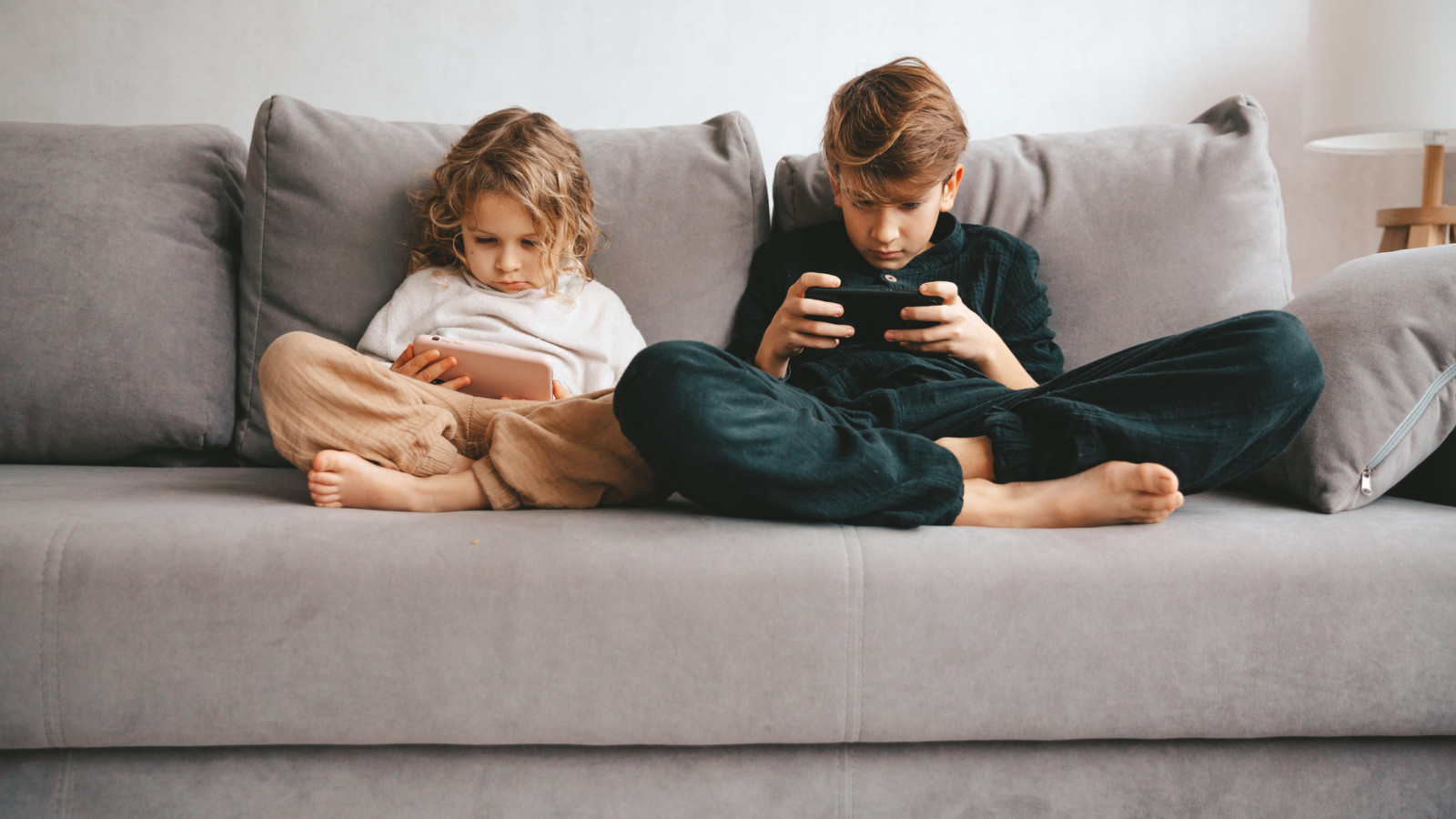Research shows that screen time for teens has nearly doubled from before the pandemic, going from 3.8 hours per day to 7.7 hours. And the more time our kids are spending on their devices, the less time they’re spending socializing, learning, and developing. A UCLA study found that kids who stayed away from screens for five days got much better at reading people’s emotions than kids who continued their normal screen-filled lives. It’s clear that we need to get creative to help our kids set boundaries.
We asked our Thrive community to share with us the tips that have helped them encourage their kids to set boundaries with their devices. Which of these tips will you try?
Set designated screen time hours
“Our children have an hour of dedicated screen time in the evenings between dinner and bedtime. They can choose between their tablets and TV, but not both.”
—Bianca Riemer, leadership coach, London, UK
Keep a technology bin
“We have a technology bin at our house, where all of the gaming controllers and iPads get stored. The bin gets taken out on set days and times, and then it gets stored away. The ‘out of sight, out of mind’ concept has helped set a healthy boundary around technology for our household. We were finding that if the controllers were left out, the kids would spend all of their spare time on technology, instead of heading outside to play basketball or do something active.”
—Emily Madill, author and certified professional coach, Nanaimo, B.C., Canada
Start a “no phones in the car” rule
“We have a rule in our family: ‘No phones while driving to school or sports practice.’ Instead during the ride, we sing along to our favorite songs and tell funny stories.”
—Giancarlo Molero, Miami, FL
Embrace off-screen activities
“Being a parent to a six-year-old, it’s a lot easier to tell our son, ‘no more electronics’ and get our way. Distraction is the tool I use. I propose another activity that I know he loves. It is usually anything that requires drawing, painting, or running, swinging, or climbing outside. Anything that will pull his mental attention away from the iPad or iPhone. Does this work for my friends with teenagers? I’ve been told it does.”
—Rudy Chavarria, founder, college web mentor, Walnut, CA
Keep a phone box next to the dinner table
“In our home, we have a phone box that we place all our devices into before sitting down for our evening meals together. This way, we can be fully attentive and present at the dinner table, without distraction. This encourages discussion, again without distraction. I am a firm believer that as parents we need to lead by example and that way we influence our children to be less reliant on having their devices tethered to themselves 24/7. This of course minimizes screen time, enhances social interaction, and builds connection — which is something we are all in dire need of, as we navigate the pandemic.”
—Candice Tomlinson, coach and hypnotherapist, Sydney, Australia
Start a family charging area
“A common charging area helps everyone in your family adhere to healthy technology boundaries. At whatever time you set, everyone returns their devices to a common charging area in the kitchen. With all the multiple charging stations now, it is easy to charge everything at once. Each evening everyone gets a great night’s sleep as a result. Modeling this behavior as a parent has a powerful impact on your kids too. As parents, we also need this reminder for our technology boundaries.”
—Ellen Delap, professional organizer, Kingwood, TX
Encourage new hobbies
“One of the ways to keep your kids away from screens is to involve them in some activity. I try engaging them in arts and crafts, or playing indoor and outdoor games with them. They must explore other activities as they may feel frustrated with something monotonous. Learning is a continuous process, as everyone has to learn throughout their life. Engage them in learning what suits their interest and aptitude. Accompany them for any occasion where they get to meet people and socialize. These help them overcome preconceived notions about themselves and the world around them.”
—Archana Kini, psychotherapist
Keep mealtimes tech-free
“Growing up in an Italian household, meals were an event. When meals were served, we all gathered around the table, talked about our day, and shared what was going on in our lives, and this was non-negotiable. Now, I implemented the same family meal time expectation in our home, but modified for the 21st century: No technology. No phones, no TV, no iPads. I know all too well how precious and finite that time is, especially with one of my daughters already in college, so honoring my parents’ custom yielded such invaluable tech-free moments with both of my girls. It’s so much easier to forge those connections, to initiate those tough conversations, to be vulnerable when there’s an activity involved, like eating. Research has shown that, on a physiological level, activities enhance the quality of our conversations by increasing the brain’s ability to be creative, focused, and empathetic.”
—Tricia Sciortino, CEO, Charlotte, NC
Put phones away before bed
“My teenage son hands over his phone every evening, so that he can have a restful sleep without any technology distracting him. The expectation and habit around technology has been set, and as long as we stick to it, everyone is happier, healthier and more connected to each other, instead of glued to our devices.”
—Emily Madill, author and certified professional coach, Nanaimo, B.C., Canada
Follow us here and subscribe here for all the latest news on how you can keep Thriving.
Stay up to date or catch-up on all our podcasts with Arianna Huffington here.


